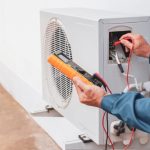 When shopping for a new HVAC system, you may have come across various efficiency ratings such as SEER, EER, and HSPF. These ratings are important indicators of how efficiently the system will cool or heat your space and can help you make an informed decision. In this blog post, we will explore each of these ratings and what they mean for your HVAC system.
When shopping for a new HVAC system, you may have come across various efficiency ratings such as SEER, EER, and HSPF. These ratings are important indicators of how efficiently the system will cool or heat your space and can help you make an informed decision. In this blog post, we will explore each of these ratings and what they mean for your HVAC system.
SEER (Seasonal Energy Efficiency Ratio)
SEER is a measure of the cooling efficiency of an air conditioner or heat pump. It calculates the cooling output in British thermal units (BTUs) divided by the electrical energy input in watt-hours. The higher the SEER rating, the more energy-efficient the system is. In the United States, the minimum SEER requirement for new air conditioners is 13, but higher efficiency units can have SEER ratings of 18 or more. Investing in a high SEER-rated system may cost more upfront but can result in significant energy savings over time.
EER (Energy Efficiency Ratio)
Similar to SEER, EER measures the cooling efficiency of an air conditioner or heat pump. However, unlike SEER, which considers a range of outdoor temperatures over a full cooling season, EER is calculated at a specific outdoor temperature (usually 95°F) and a specified indoor temperature (usually 80°F). EER is calculated by dividing the cooling output in BTUs by the electrical energy input in watt-hours. Again, a higher EER rating indicates a more energy-efficient system. EER ratings are typically used for commercial and window air conditioning units.
HSPF (Heating Seasonal Performance Factor)
While SEER and EER focus on cooling efficiency, HSPF measures the heating efficiency of an air source heat pump. It calculates the heating output in BTUs divided by the electrical energy input in watt-hours. The higher the HSPF rating, the more efficient the heat pump is at providing heat. In colder climates, it is especially important to have a heat pump with a high HSPF rating to ensure optimal heating during winter months. The minimum HSPF requirement for new heat pumps in the United States is 7.7, with higher efficiency units having HSPF ratings of 10 or more.
Comparing Efficiency Ratings
When comparing HVAC systems, it is crucial to consider the SEER, EER, and HSPF ratings together to get a comprehensive understanding of the unit’s overall efficiency. A system with a high SEER rating might not necessarily have a high EER or HSPF rating, and vice versa. For optimal energy efficiency, it is recommended to choose a system with high ratings in all three categories.
The Benefits of High Efficiency HVAC Systems
Investing in a high-efficiency HVAC system can provide several benefits for homeowners. Firstly, these systems consume less energy to cool or heat your space, resulting in lower utility bills. Over time, the energy savings can offset the higher upfront cost of the system. Additionally, high-efficiency units tend to be quieter and have more advanced features, such as variable-speed motors, which provide better temperature control and improved indoor comfort.
Environmental Considerations
Opting for a high-efficiency HVAC system not only benefits your wallet but also the environment. Energy-efficient systems consume less electricity, reducing the demand for fossil fuels and greenhouse gas emissions. By choosing an HVAC system with high SEER, EER, and HSPF ratings, you are contributing to a more sustainable future and helping to combat climate change.
Summary
Understanding HVAC efficiency ratings such as SEER, EER, and HSPF is essential when selecting a new system for your home. These ratings provide valuable insights into how efficiently the unit will cool or heat your space and can help you make an informed decision. By considering all three ratings together and opting for a high-efficiency system, you can enjoy lower energy bills, improved indoor comfort, and contribute to a more sustainable future. Consult with HVAC professionals to determine the best options for your specific needs and ensure maximum efficiency for years to come.
Need a Commercial HVAC Contractor in St. Louis Park, MN?
Locally owned and operated since 1991, Air Climate Control Inc specializes in commercial service and repair of air conditioning, heating, and refrigeration, serving Minneapolis and the surrounding areas with quality, prompt, and reliable work. Air Climate Control Inc strives to provide same-day service to ensure client comfort and satisfaction. We specialize in preventative maintenance plans as well as repair and can sub-contract for installation service. Our estimates are always FREE of charge. Call us TODAY for all of your commercial refrigeration, air conditioning, and heating needs!
